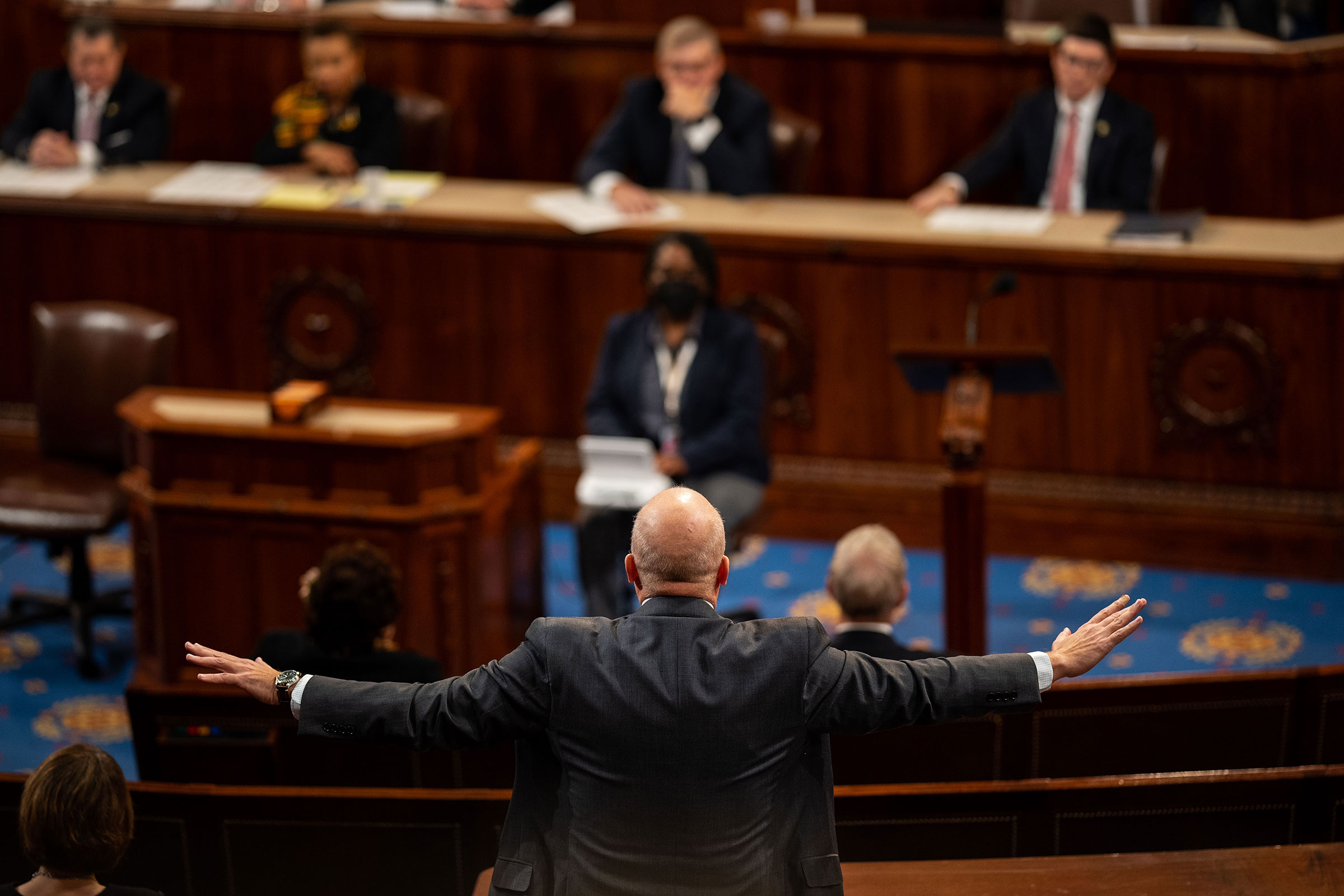This article is part of The D.C. Brief, TIME’s politics newsletter. Sign up here to get stories like this sent to your inbox.
When the 118th Congress attempted to get underway on Tuesday, the presumptive Speaker-in-waiting, Rep. Kevin McCarthy of California, half-joked to reporters that he was used to spending time on the House floor that he hoped to soon lead. “I have the record for the longest speech ever on the floor,” he told reporters after a contentious meeting with fellow Republicans. “I don’t have a problem getting a record for the most votes for Speaker.”
While besting the record of 133 rounds of balloting to pick a Speaker is probably not in the cards for a defiant McCarthy, after failing on nine consecutive rounds to secure sufficient support among his Republican colleagues, he surely must feel like history is inching closer than he’d like.
McCarthy has long held the dream of wielding the gavel, but his chase has become an undisputed nightmare. A cascade of headlines have some combination of Kevin McCarthy and humiliation in them. Twitter is gleefully spiking his shortfalls. Democrats, who started the week amused that, for once, it wasn’t them in disarray, have started to seethe at the chaos—but are nonetheless sticking united behind their own leader, Rep. Hakeem Jeffries of New York. And, despite all of this, McCarthy doesn’t really seem to have a strategy to win other than to wait out his hostage-takers.
Lawmakers are growing more irritated by the day, as a handful of far-right Republicans have refused to allow McCarthy to win with a majority. Even though 90% of the Republican majority supports McCarthy—or at least his bid to become Speaker—a small minority of 20 holdouts simply won’t let him pass the threshold. The only victory for House Republicans so far has been a narrow majority vote, and that was to stop voting altogether and adjourn on Wednesday night.

Around Washington, insiders have started to shift their conversation in a crucial way. At the start of the week, a lot of the chatter was about what McCarthy could trade away to win over the Never Kevins, the bloc of lawmakers who insisted they’d never support his ascent to Speaker. During closed-door meetings and hallway interventions, McCarthy and his allies have offered a seemingly never-ending raft of concessions: two seats on the powerful Rules Committee for the Freedom Caucus, plus another seat for one of their friends; allowing for one member to call a vote of no confidence in the Speaker at any time; a redo of the budgeting process to split the major spending bills into 12 pieces; and a vote on term limits.
On the outside, the nominally independent campaign arm aligned with McCarthy pledged it would no longer use its deep pockets to meddle in open primaries, meaning the far-right elements were free to nominate fringe candidates without fear of the Establishment working to block them. (It was reminiscent of Senate Republicans’ decision to take a hands-off approach; ask Minority Leader Mitch McConnell how that worked out.)
The House holdouts accepted the wins. But they still couldn’t get to yes on McCarthy as the person at the top of the heap. They just didn’t trust him, even after Donald Trump himself directly intervened to help his most useful supplicant. They cashed millions of dollars in checks from him and his allies, but money wasn’t going to buy loyalty.
Which is why it might be time for Washington to stop treating this like any other negotiation. McCarthy has traded away much of his potential power as Speaker, offloading a lot of the prerogatives to a vocal minority that, for the most part, doesn’t even seem to care much about its legislative muscle. Even if McCarthy emerges with a gavel in his hand, his knuckles will be bloodied by the rulers his far-right tormenters have been using to whack him. His hold will be weak, given a single malcontent can call for his removal—and be guaranteed a vote on it. And the powerful appropriators won’t have final say over spending, given an open-ended amendment process that could turn a tightly written spending package into an Amazon wish list on the fly. The damage, even in McCarthy’s uncertain victory, has been done.
Maybe it’s time to call the goal here what it actually is: chaos. This isn’t about policy. It’s about personality and personal aggrandizement. McCarthy allies asked the holdouts last night what they wanted, and they couldn’t get an answer. “Behind closed doors, tell us what you actually want, or shut the f— up,” Rep. Dan Crenshaw of Texas fumed. He wasn’t alone.

“The Taliban 20” is how some lawmakers have started referring to their intransigent colleagues. Others are branding them “The Band of Others.” Rep. Chip Roy of Texas has emerged as perhaps the most sincere of the GOP holdouts in pushing for achievable changes to actual rules. Yet his demands have been largely drowned out by those wanting…well, something. Even some of the House’s most unpredictable right-wingers lined up behind McCarthy, including Marjorie Taylor Greene, meaning this wasn’t about chasing conspiracy theories or kook agenda pieces. Motivating the opposition here is owning McCarthy, making this hurt, showing how a few insurrectionists can derail normalcy in the name of, frankly, fun.
This is what happens when celebrity is treated as a substitute for governing chops. You get obstruction for the sake of it, leaving legitimate concerns about the legislative process from Roy lumped with the tantrums. A tyranny of the minority has left the House stuck in park as Republicans look for the keys they already have in the ignition. They just can’t bring themselves to turn over the engine, because apparently turning on themselves is so much more delightful.
Make sense of what matters in Washington. Sign up for the D.C. Brief newsletter.
More Must-Reads from TIME
- Cybersecurity Experts Are Sounding the Alarm on DOGE
- Meet the 2025 Women of the Year
- The Harsh Truth About Disability Inclusion
- Why Do More Young Adults Have Cancer?
- Colman Domingo Leads With Radical Love
- How to Get Better at Doing Things Alone
- Michelle Zauner Stares Down the Darkness
Write to Philip Elliott at philip.elliott@time.com